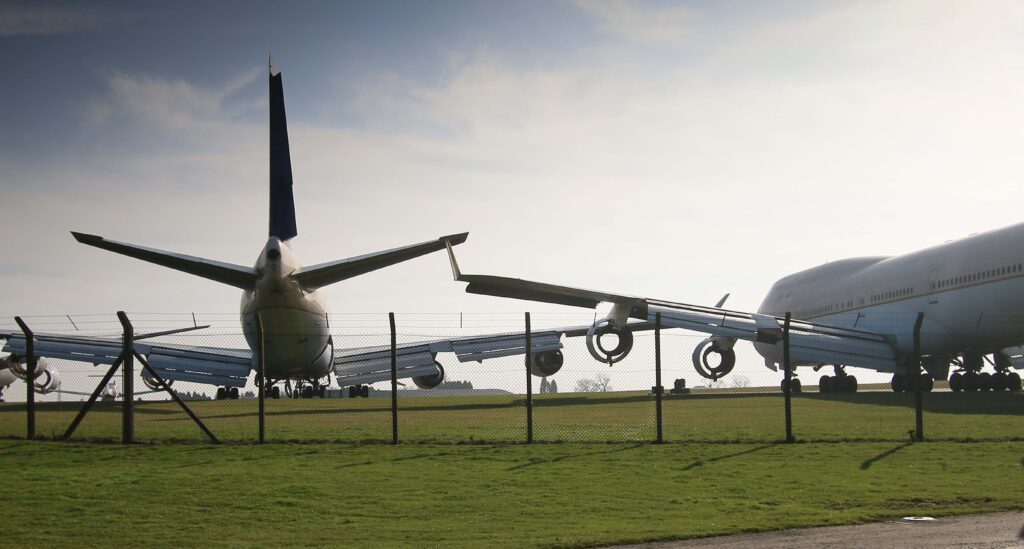As airlines were forced to put their aircraft into short or long-term aircraft storage, companies, including Maintenance, Repair, and Overhaul (MRO) organizations had a heyday as there was an unprecedented amount of demand to store or preserve jets. Now, as no recovery is in sight and the winter months are coming, the harsh weather presents a problem for all involved parties.
Overflow of jets
As the current COVID-19 crisis hit its peak in April, 82.1% of narrow-body and 85.9% of wide-body aircraft were parked, the International Civil Aviation Organization (ICAO)’s data reads. The downtime of regional jets hit its peak in May 2020, when 77.6% of the global fleet was parked. Cargo aircraft were spared, as the global freighter fleet fell in number only in February 2020 – and has only grown since.
The number of stored aircraft, unfortunately for airlines, might only increase. No short-term recovery is in sight, as the high-capacity summer months have passed. For example, throughout 2019, there was a visible drop and a peak in Ryanair’s traffic numbers. If the airline carried 9.6 million passengers in February 2019, the number increased to 13.8 million during August 2019.
Lufthansa (LHAB) (LHA) (LHAB) (LHA) , a full-service airline, exhibited a similar passenger curve throughout 2018 and 2019.
Furthermore, according to the International Air Transport Association (IATA)’s forecast, overall traffic levels are expected to fall by 66% in 2020, a downgrade from the previous forecast of 63%. The association’s chief executive and director general Alexandre de Juniac called August 2020 the “worst-ever summer season” for aviation, adding it would only add to “the current catastrophe.”
Ever-accelerating retirements
An unfortunate cocktail of seasonality and lack of demand for travel has resulted in carriers accelerating the retirement of their aircraft. Delta Air Lines, for example, decided to accelerate the retirement of their Boeing 717, 767-300ER, and Mitsubishi CRJ-200 aircraft.
“Delta evaluated its Boeing 717-200 and CRJ-200 aircraft as well as the remainder of its Boeing 767-300ER aircraft for impairment and, on September 23, 2020, concluded that the carrying value of these aircraft was no longer recoverable when compared to their estimated remaining future cash flows,” the company announced in September 2020.
The aforementioned Lufthansa (LHAB) (LHA) (LHAB) (LHA) informed its employees that it would retire 50 additional aircraft by 2025, increasing the number to 150. Amongst the retirements was the Airbus A380 fleet, which would only be brought back to service in case of an unexpected recovery of the market. Globally, 32% of the total aircraft were grounded at the beginning of September, showcased ch-aviation data. While it was significantly less than the storage peak seen at the end of April, when 59% of the world’s aircraft were grounded, the recovery stopped. Seemingly, the groundings are set to only go up from this point on.
The issue is that with the late-fall and winter weather kicking in, parking aircraft at desolate locations with a dry climate becomes a priority. The European Union Aviation Safety Agency (EASA) issued a document, which outlines how to return an aircraft from storage in relation to the pandemic. One of the hazards the agency highlighted was the effects of the environment, including humidity, salt, and dust. One of the ways to mitigate the risk is to add additional protection, which would mean additional storage costs for an airline.
Sending fleets to the desert seems like the most optimal solution, as the dry climate does help to mitigate the risk of aircraft parts corroding. Cathay Pacific, for example, utilizes Alice Springs, Australia as its storage site. The Australian city averages a yearly relative humidity of 25% with 279.7 millimeters of rainfall yearly. Hong Kong, whereupon Cathay is based, averages 78% and 2,398 millimeters, respectively. But Alice Springs, where Singapore Airlines Group also shipped its wide-body aircraft including the A380, is running out of space. It has 100 slots for storage and in late-September, Asia Pacific Aircraft Storage (APAS), the company that runs the storage site at Alice Springs Airport (ASP), stated that it ran out of them.
Tarmac Aerosave, which has four storage facilities across France and Spain, indicated that it can host 270 aircraft in its storage facilities. 195 aircraft are currently on site, according to its website. AeroTime News approached Tarmac Aerosave and ComAv, a Victorville, United States-based aircraft storage solution provider.
